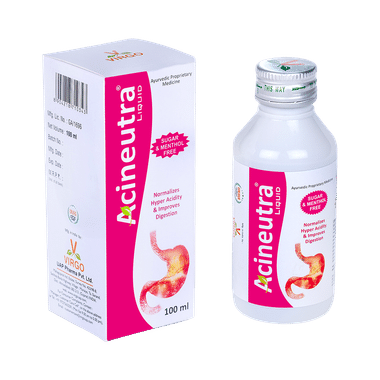Rs. 90
Rs. 100
10% off
Available in other variants

Product Details
Virgo Acineutra Liquid is an Ayurvedic syrup designed to support overall digestive and stomach health. The liquid is formulated to reduce hyperacidity, burning sensation, acid-peptic disorders, and flatulence in the stomach.
Key Ingredients:
Indications:
It is indicated for hyperacidity, gas and flatulence.
Net Quantity:
100/200 ml
Product Form:
Liquid
Key Benefits:
Dosage:
1-2 teaspoonful 1/2-1 hour after meal with cool water or whenever symptoms arise or as advised by a healthcare professional.
Safety Information:
Key Ingredients:
- Dugdha Pashan (Powder) (R.T.) 400 mg, Praval Pishti (Powder) (R.T.S.-1) 50 mg, Mukta Shukli Bhasma (Powder) (R.TS-1) 50 mg, Aloe vera Juice (Leaf) (API) 1.5 ml (Aloe Barbadensis) (Each 10 ml contains Extract derived from), Kokum (Fruit) (Garcinia Indica) (A.P.1.) 500 mg, Colour: Tartrazine and Brilliant Blue Flavoured Liquid Base, Preservatives: Sodium Benzoate IP, Sodium Methyl Paraben IP, Sodium Propyl Paraben IP
Indications:
It is indicated for hyperacidity, gas and flatulence.
Net Quantity:
100/200 ml
Product Form:
Liquid
Key Benefits:
- Virgo Acineutra Liquid helps control acid secretion and neutralizes excess acid in the stomach, which can reduce symptoms of hyperacidity and acid-peptic disorders
- The syrup may help manage gastric and duodenal ulcers, providing relief from pain and discomfort
- Virgo Acineutra Liquid has properties that can alleviate symptoms such as pain, burning sensation, acid reflux, and nausea, promoting overall digestive comfort
- The syrup has a soothing effect on the gastrointestinal tract, helping to reduce inflammation and irritation
- Virgo Acineutra Liquid can help manage the acid-reflux mechanism, which is the backward flow of stomach acid into the oesophagus, reducing symptoms like heartburn and regurgitation
Dosage:
1-2 teaspoonful 1/2-1 hour after meal with cool water or whenever symptoms arise or as advised by a healthcare professional.
Safety Information:
- Read the label carefully before use
- Due to natural herbal ingredients, the colour may tend to change over time. However, the efficacy of the product remains the same
- Store in a cool and dry place
- To be used under medical supervision only
- Should be avoided during pregnancy












